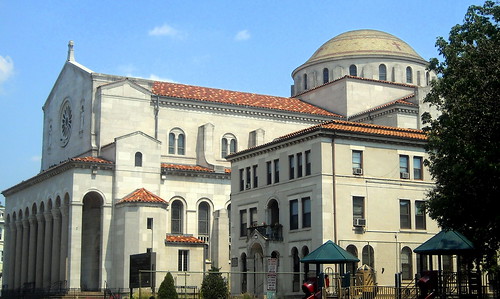We have a fascinating a scene from Mount Pleasant today, captured by Gerda. There is a fascinating complexity to the shot, with the foreground texture of the door, the faint reflection in the glass, and the main scene of the laundromat. As well, looking onto the people in the shot, you start wondering what is happening. Are the two female laundromat patrons looking at the photographer or at something out on the street? And Gerda was able to frame this shot with two people going about simple, every day actions (the man folding laundry and the woman checking her cell). Gerda wisely has this shot in black and white, which removes the potential distraction of color, allowing us to focus only on composition. An excellent shot, to be sure.
Tag Archives: mount pleasant
Where We Live: Mount Pleasant

‘Shrine of the Sacred Heart’
courtesy of ‘NCinDC’
The diverse and eclectic Mount Pleasant neighborhood is the topic of this week’s Where We Live. It was once a streetcar suburb and is now a mix of housing types with a main street of its own. It has great access to downtown and is right in between Adams Morgan and Columbia Heights, two very developed areas, but it has retained a quieter residential character. Read on to hear the very cool history of Mount Pleasant and what to check out next time you’re there.
History: The neighborhood dates back to 1727, when a large area of what is now Columbia Heights/Adams Morgan/Mount Pleasant was granted to James Holmead. The area was named Pleasant Plains in 1750, and then became part of the District when it was established in 1791. During the Civil War, the area was home to a hospital, and after the war the neighborhood became known as Mount Pleasant Village. The area was separated from the rest of the District by rural land, as DC hadn’t grown into its 10-mile square yet, which is why Mount Pleasant doesn’t quite line up with DC’s orderly grid of streets. In the 1870s, the area became the District’s first streetcar suburb, and many middle class residents moved in to take advantage of the quick commute to Washington City.
The area has changed a lot since then. In the 1950s, the neighborhood became racially segregated, with many white residents leaving the city altogether. The 1968 riots only made things worse, and the area entered a period of decline. However, throughout the 1960s Spanish-speaking immigrants began moving to Mount Pleasant, establishing vibrant communities of El Salvadorean and Dominican Republic immigrants. In the 1980s and 1990s, affluent professionals began moving into the area for its access to jobs downtown and its historic residential housing stock. And today, the population is a mix of all those eras: approximately one third of residents are white, one third are African-American, and one third are Hispanic.
Neighborhood Character: Mount Pleasant has a strong historic residential character throughout the neighborhood and a pedestrian-friendly commercial strip along Mount Pleasant Street. Rowhouses and smaller apartment buildings make up the neighborhood, and many historic structures from the early 1900s remain. The area is very walkable, with strong transit access and a variety of neighborhood destinations. In recent years, Mount Pleasant has been changing due to the nearby development of Columbia Heights. Tim, author of the neighborhood blog The 42 and Mount Pleasant resident of six years, had this to say: ” There obviously have been hundreds of changes, some from within and many from without. We’ve been greatly affected by the development of Columbia Heights. Most of that has probably been good for Mount Pleasant in terms of access to amenities. On the other hand, we’ve seen stagnant development of out own commercial strip at the same time.”